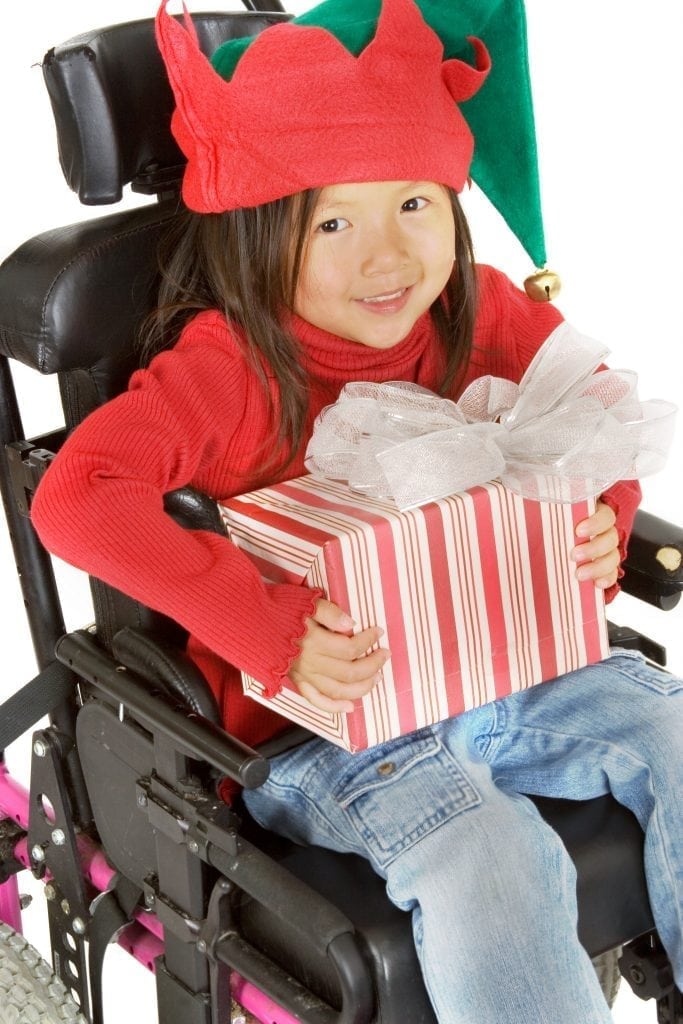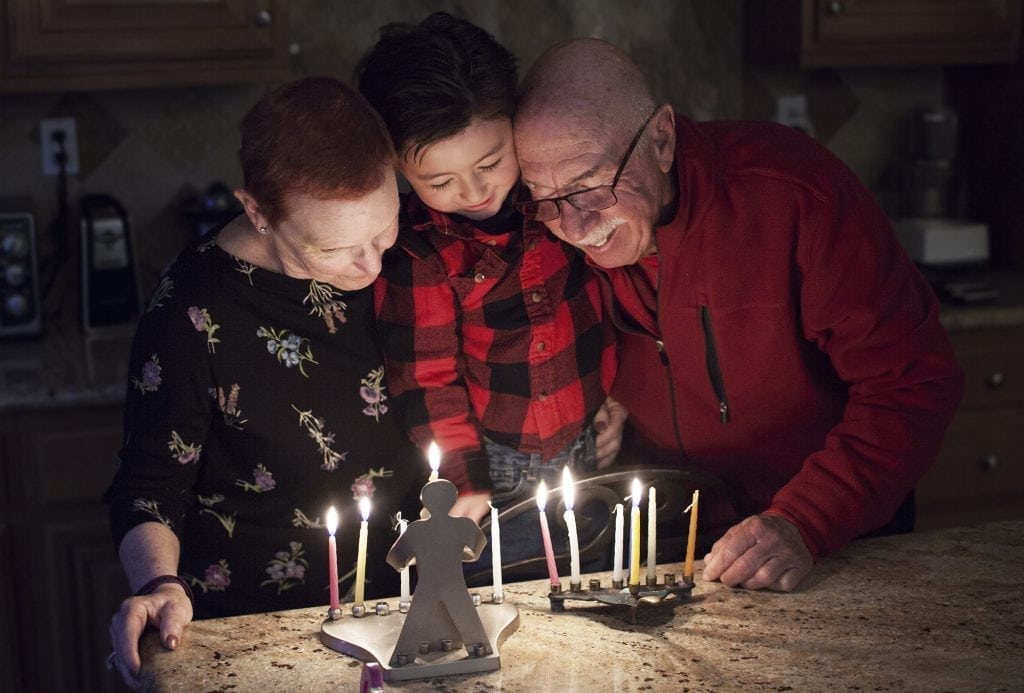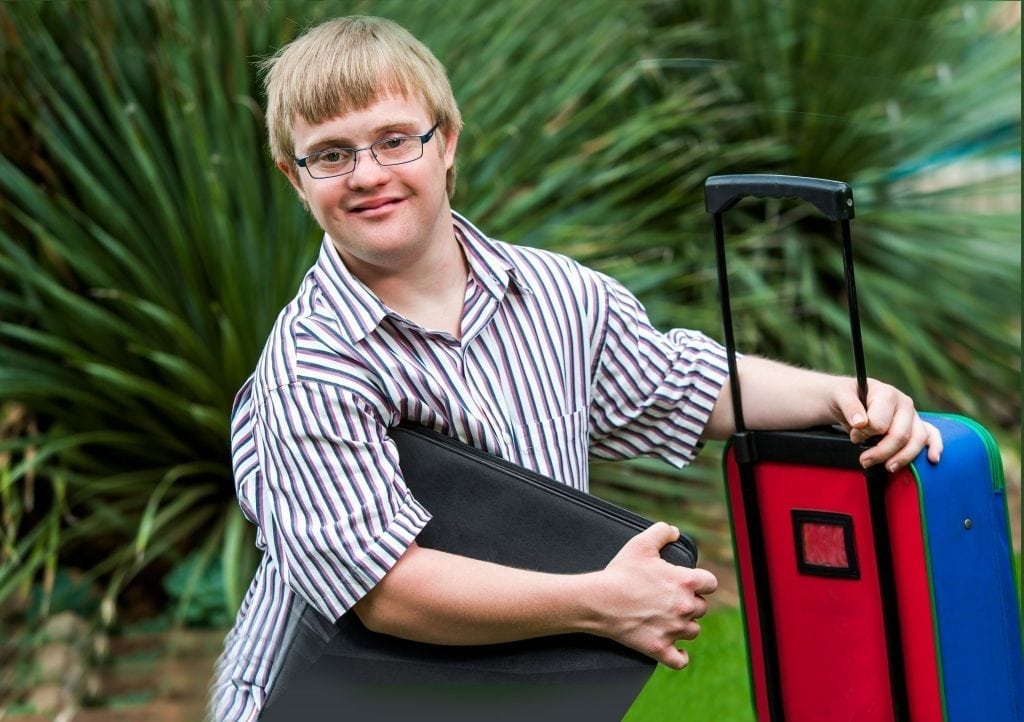 Keep things simple. Plan ahead. Stay flexible. Keep the lines of communication open.
Keep things simple. Plan ahead. Stay flexible. Keep the lines of communication open.
They may seem like common-sense tips for just about any life situation, but for parents of children with disabilities, these bits of wisdom are especially applicable during the holiday season – a time of year that is often as stressful as it is joyous.
You want to celebrate just like – and often in the company of – friends, family and loved ones. The demands of your child’s disability make “traditional” celebrations challenging or, in some cases, not possible, but people still want to include you in the holidays. So, you negotiate the logistics and, sometimes, the guilt.
“It sort of depends where people are in the process of coming to terms with who their child is,” says Leslie Lobel, a consultant who works with children with disabilities and their parents, and whose daughter is a resident of United Cerebral Palsy of Los Angeles’s group home. “The holidays can be a time where you’re thankful for a healthy year. It can also be the time of year when you realize that other children your child’s age are reaching milestones. All of these emotions come up and everything is heightened by the frenzy of the holidays.”
Whatever a parent’s state of mind, holiday staples such as gift-giving, travel and family get-togethers are still doable, according to Lobel and other disability consultants and advocates. Help is available, and planning, sensitivity and simplicity will invariably play a role.
Specialized Gift-Giving
 At this time of year, everyone from close friends and family to distant relatives who do not see your child often will be asking: “What can I get him?”
At this time of year, everyone from close friends and family to distant relatives who do not see your child often will be asking: “What can I get him?”
The sentiment is a generous one, but rephrasing the question shows that the gift-giver has thought more specifically about the child — for instance, taking into account a child’s limited mobility or severe developmental delays.
“The most minor adjustment to that question takes the pressure off me,” says Lobel, whose daughter Sarah has physical and developmental disabilities. More helpful questions, she says, could include: “Is there something Sarah has particularly enjoyed this year?” “Is there something that she needs replaced?” and “What kinds of things does she like to wear that are most comfortable for her?”
A considerate gift-giver will find that a little bit of careful thought will go a long way. The season’s most popular toy will not necessarily be appropriate for a child with sensory issues or developmental delays. But items or experiences that a parent and child can share – such as books, music or soft blankets – are safe. The same is true for gift certificates for stores with a wide selection of items, including Brookstone, Target or Bed Bath & Beyond. If the gift-giver can sew, he or she could offer to create a pillow or some sort of comfortable wheelchair accessory.
Parents of children with disabilities should feel free to suggest gifts, which isn’t pushy. It is a way of advocating for the child. “We work with our parents to be able to feel comfortable advocating for their child and sharing what their child needs,” says Laura Campana, director of infant and early childhood programs at Junior Blind of America and mother of a child with a disability. “I would mention what my child is into. For a lot of special-needs kids, visually impaired or otherwise, vibration is huge. They’re going to like any toy that vibrates.”
Increased awareness of the needs of people with disabilities of all sorts has opened up many new possibilities for gift-givers. Large retailers, including Toys “R” Us and Amazon, have gifts specifically designed for people with disabilities. Thoughtful, personalized gestures such as a donation in the child’s name to a program, organization or service that has helped the family are another option. “I got assistance from a disability-rights organization, and a friend knew that,” Lobel says. “So, when someone makes a donation to something that’s made a difference in our lives, wow! That’s paying it forward, right? That’s what the holidays are meant to be about.”
Navigating Family Gatherings
 Many parents have tales of holiday gatherings that went sideways. Their child wouldn’t sit still, didn’t like the food, made noise, didn’t (or couldn’t) converse. In other words, she acted like herself.
Many parents have tales of holiday gatherings that went sideways. Their child wouldn’t sit still, didn’t like the food, made noise, didn’t (or couldn’t) converse. In other words, she acted like herself.
Oftentimes, out of fear of potential embarrassment and “ruining” what is supposed to be a joyous occasion, parents with a child who has a disability cocoon themselves during the holidays, politely declining invitations. That’s their choice, say advocates, but it’s not the only option. With some advance preparation, parents can increase the chances of a successful event.
That might mean asking the hosts about their home’s bathroom accessibility if the child uses a wheelchair, or letting them know that the child is afraid of dogs or cats. For a child with a developmental disability, the parent could ask what time the food will be served and – depending on the child’s needs – be prepared to arrive late or leave early.
When she was dating the man who would eventually become her husband, Elaine Hall – then a single parent – went to her future in-laws’ Hanukkah celebration. She arrived promptly at 5 p.m. with her son, Neal, who has autism and was 7 at the time. Hall was not aware that the family’s tradition was to have everyone participate in the cooking, and that the food would not be on the table until 7 p.m.
“Neal held it together for two hours and when we sat down, we felt everybody was looking at us as we dropped a fork and made a mess with the apple sauce,” says Hall. “It went from bad to worse. Presents were at 9. He was tired, and things got really bad really fast. I had to carry him out.”
From that experience, Hall, founder of The Miracle Project and author of “The Seven Keys to Unlock and Understand Autism,” learned the value of gathering information in advance. If the food would be served at 7 p.m., then that’s when she and Neal would arrive. She asked hosts if they could provide a quiet room where Neal could take a break, or whether they would be OK with them taking frequent walks. If a large gathering is planned, a parent and child might ask whether they can drop by two hours before things get started and stay for just a short part of the actual party.
It also helps, Hall says, to prepare the child in advance by talking or reading about the holiday being celebrated and about what they can expect. If the gathering will include a ceremony, a parent could practice the ritual with the child. Another option: Host your own gathering and have the relatives come to you.
“I think people want to hold on to the feeling they had as a child and make everything look like it did with the rituals being exactly the same,” Hall says. “If you have a new family member who has a disability, it’s a whole different experience. If we’re really in the true sense of giving, then giving of ourselves to do things a little differently can enhance the entire experience.”
Holiday Travel
 If taking a child with a disability to an unfamiliar place for dinner or a holiday party presents a challenge, then packing up the car for a road trip or getting on an airplane is a challenge on steroids.
If taking a child with a disability to an unfamiliar place for dinner or a holiday party presents a challenge, then packing up the car for a road trip or getting on an airplane is a challenge on steroids.
Advance preparation before the journey is critical. Parents have to figure out how to bring all of the necessary medications, special equipment and, if applicable, know where the closest hospital or emergency room is located.
The journey comes with its own variables, particularly if a parent is bringing a child with sensory sensitivity on an airplane. Air travel, with all of its unfamiliar sounds, confinement, cabin pressure and cramped bathrooms, can be difficult to prepare for. Disability activists recommend calling the airline in advance and trying to arrange for an expedited check-in to avoid lines. Airlines have partnered with autism advocacy groups to organize specialized “airport experience rehearsals” in certain cities for people on the autism spectrum.
“We prepared him,” recalls Hall of a flight with her son, Neal, who has autism, to Washington DC. “We practiced every single detail. We went through security and I thought, ‘Man, we’ve got this.’ What I didn’t practice is that the airplane is outside, and isn’t it cool that you can see it through the glass and then all the alarms are going off as he’s trying to walk out the door.” Hall, author of “The Seven Keys to Unlock and Understand Autism,” says preparation for the unexpected is essential. “The best preparation you can do is to be really calm, really centered,” she says.
Travel by car, while easier in some ways, offers its own set of challenges. How, for instance, do you keep a child with a disability entertained for hours on end? Besides relying on the diversions of tablets and technology, Hall hit a 99-cent store, buying a bunch of items for her son to unwrap at various points during the journey.
The standard advice for road trips applies to holiday travel for kids with disabilities – and those without: Don’t forget the snacks, chargers, music and favorite toys. In addition, plan plenty of bathroom breaks and sightseeing stops to break up the trip.
As with party-going, family gatherings and gift-giving, parents of children with disabilities need to decide for themselves how much holiday travel they can handle. Many organizations devoted to people with disabilities hold their own holiday celebrations, which are geared toward the children’s abilities and connecting parents with other parents.
“Our biggest thing we tell families is, ‘Do what works for you,’” says Campana. “Many times, parents are bending over backwards trying to make family members or other people happy, and their kids end up suffering in the end. Do what works for you. That’s your new normal.”




























